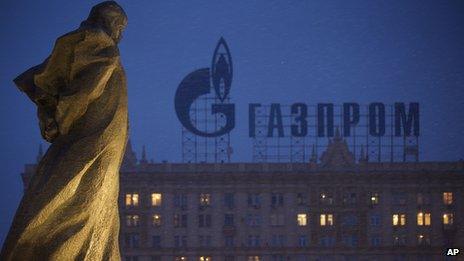Sanctions: What could be the next move?
- Published

The European Union and the US have been imposing sanctions on Russian and Ukrainian individuals. As the diplomatic crisis intensifies, further economic action could happen.
What action has been taken so far?
On 6 March, the European Union and the US agreed a staged approach. It started with the immediate suspension of talks on closer economic cooperation between the EU and Russia, and on preparations for the forthcoming G8 Summit in Sochi.
The EU is also putting into place plans for closer financial and political cooperation in support of the new Ukrainian government.
Following the Crimean referendum on 16 March, the EU and US carried out their threat to target individual Russians and Ukrainians.
The US ordered the freezing of assets and travel bans on 11 individuals, while the EU imposed such sanctions on 21 people.
The EU later added another 12 individuals to its sanctions list, and the US announced further sanctions on individuals and against the Rossiya bank.
But are these just sighting shots?
Political leaders on both sides of the Atlantic made it clear that further action would follow after Russian President Vladimir Putin signed a treaty to annex Crimea from Ukraine.
The EU's potential sanctions list is thought to include more than 100 people.
When the sanctions were first introduced, mainly politicians and officials were targeted by the EU and the US.
But the effects of new sanctions on individuals such as Russian businessmen have started to ripple out.
Visa and Mastercard are reported to have stopped processing payments to SMP bank after its billionaire co-owners Boris and Arkady Rotenberg were included in US sanctions.
And Rossiya bank said the two credit card firms had also stopped processing its payments.
US President Barack Obama has signed an order to enable the US to impose sanctions on sectors of the Russian economy.
Hasn't the UK suspended military co-operation with Russia?
Yes, although this is probably not as big a blow as it sounds - to either side
The UK has halted military export licences to Russia, currently said to be worth about £86.3m. The UK does not supply anything considered militarily sensitive anyway.
On the suspended list is cloth for uniforms, which accounts for 60% of the exports. The list also includes alloy wheels, nuts and bolts for armoured vehicles, handheld radios, and visors for pilots' helmets.
The UK, along with France and the US, has suspended joint naval exercises, which would have included a Royal Navy ship visit to St Petersburg.
Could more sanctions be imposed?
The EU and US could seek to isolate Russia by severing diplomatic links.
Another option might be to attempt to remove Russia from international bodies such as the World Trade Organization, International Monetary Fund or World Bank.
Also, President Vladimir Putin has been very keen to bolster co-operation on investment, research and education.
Marginalising him on the international stage could be a blow to Moscow's prestige, although it is unlikely to do much damage economically.
That said, the EU and US will not want to cut off dialogue with Russia.
Could this dispute develop into a full-blown trade war?
That would certainly ratchet up the pressure on Moscow. As seen in the graph above, the EU is by far Russia's biggest trading partner.
Imports to the EU from Russia are dominated by crude oil and gas. According to the Energy Information Administration, European countries import 84% of Russia's oil exports, and about 76% of its natural gas.
Germany is the single biggest importer of Russian oil and gas, while the UK buys about 6% of Russia's gas.
What specific action might be taken?
The introduction of direct economic sanctions would probably mean import/export bans.
If specific firms were targeted, then the state-owned energy giant Gazprom would probably be high on the list.
For instance, Gazprom could be banned from winning more contracts within the EU.
The US and Europe might also restrict Russian banks and corporations from access to finance.
It was revealed this month that the UK had considered closing London's financial centre to Russians as one possible sanction.
Won't a trade war also hurt the West?
Quite possibly. Banking, for example, is a two-way process. Nina Schick, of Open Europe, estimates that Russian companies have $653bn of foreign debt.
Any financial shocks in Russia will impact on the banking systems in Europe and the US.
Targeting Russian energy companies also has its consequences, especially for Europe. What happens to the gas price if, say, Gazprom retaliates by limiting supplies.
Another Russian energy giant, Rosneft, has close ties to BP.
Neither the UK company nor the UK government would want BP's interests undermined.
So, the EU and US room for manoeuvre is limited?
It's certainly complicated, and not without negative implications for Western governments.
Some further sanctions would require agreement from EU member states. As the consequences of tougher sanctions might hit countries differently, getting that approval could be a protracted process.
That said, at this moment there appears to be strong political will in the US and Europe for action that is more than just symbolic.
"If Russia continues to interfere in Ukraine, we stand ready to impose further sanctions," President Barack Obama said.
It is a statement from which many observers say he cannot now back down.